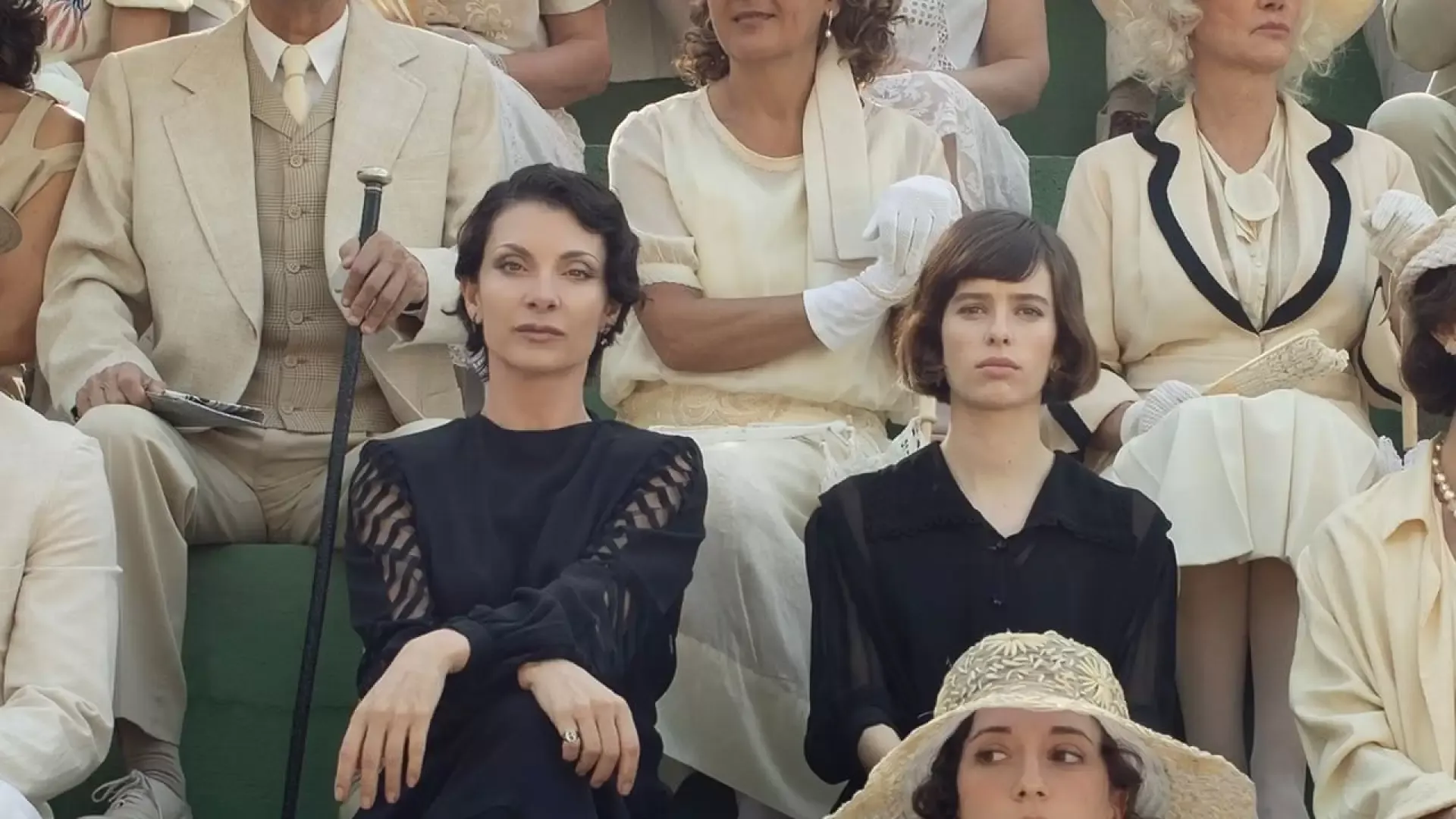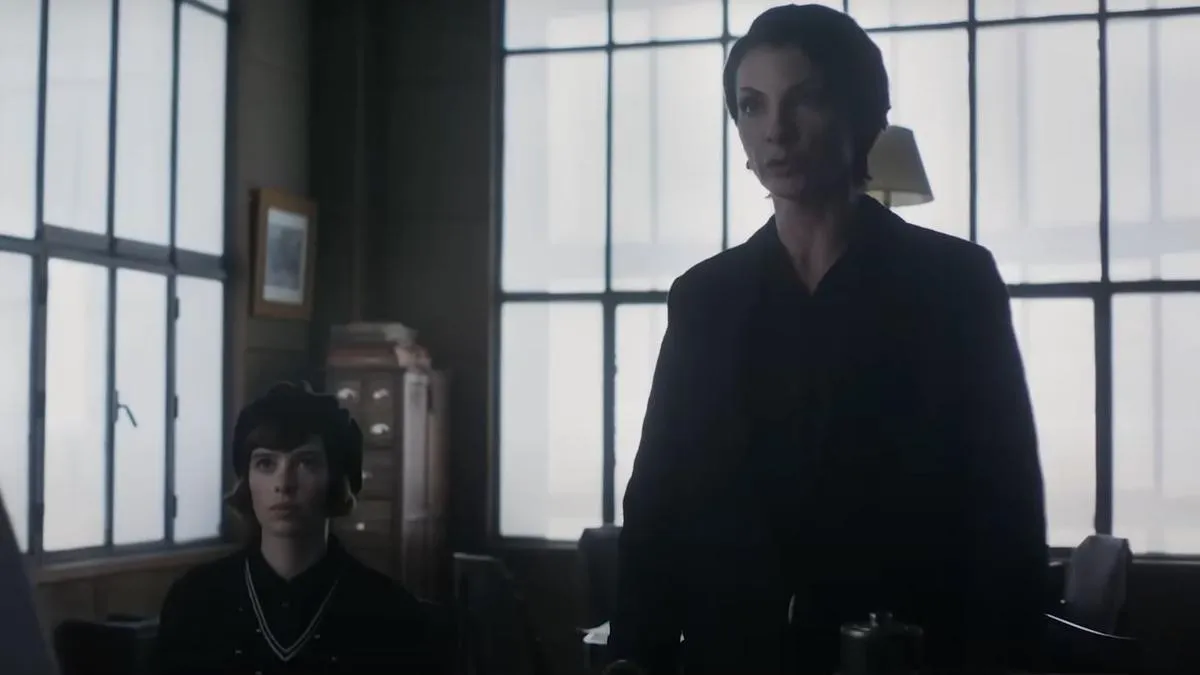The tragic story of Hildegard Rodrguez, a child prodigy whose mother, Aurora, moulds her into a living embodiment of radical ideals, is intricately woven into The Red Virgin, directed by Paula Ortiz. Set against the tumultuous background of early twentieth-century Spain—an era marked by social upheaval and the zeal of the Second Spanish Republic—the film transports viewers to a world where maternal obsession and ideological fervour mix.
Aurora’s ambitions for her daughter, whom she sees as the “woman of the future,” devolve into a claustrophobic dynamic in which love gives way to control. This unsettling story unfolds as Hildegard struggles with her emerging identity in the face of her mother’s unwavering expectations, eventually culminating in a tragic and unavoidable meeting.
The ramifications of Hildegart’s life go far beyond her tragic fate; they reflect the perennial struggle between human autonomy and ideological imposition. Her story is a cautionary tale about the risks of fanaticism—how noble ideals, when unrestrained, can become instruments of oppression (a paradox best expressed as “freedom through confinement”).
Hildegard, a character of intellectual brilliance and early feminist philosophy, is paradoxically ensnared by the exact ideology intended to liberate her. This duality is more than just a literary technique; it reflects bigger socioeconomic themes, such as the tension between individual agency and the collective pressures of cultural standards.
As the film uncovers the dimensions of Aurora’s obsession, it also criticizes the dogmatic ideologies that may transform familial connections into battlegrounds of control and surrender. This dynamic is consistent with current conversations about parental influence and the ideological shaping of kids, raising concerns about the nature of freedom in an age where identity is frequently negotiated in the shadow of societal norms. The Red Virgin provides a lens through which to evaluate the ongoing fight for autonomy and the perils of ideological fanaticism, transcending its historical setting in this regard.
Character Analysis: The Duality of Motherhood and Ideology
Aurora Rodríguez is shown as a difficult mother caught up in her lofty ambitions. Her reasons are loaded with a toxic mix of love and control, a psychological state that borders on fanaticism (enough to make even the most ardent ideologue raise an eyebrow).
She sees her daughter, Hildegard, as more than just a child, a scientific experiment—embodying her extreme ideas. This viewpoint is bolstered by her terrifying conviction that she is creating a “superwoman,” a term that now feels more like a warped brand than a noble quest.
Aurora’s role as a mother shifts between protective and oppressor. She is the architect of Hildegart’s academic aspirations, but she also creates walls of isolation around her, limiting her freedom under the idea of enlightenment.
This paradox asks viewers to consider the delicate balance between nurture and suffocation. Aurora paradoxically stifles the autonomy she purports to support in her desire to mould a revolutionary thinker. This could even be described as a terrible case of “ideological maternalism”—where the urge to empower becomes a control technique.
Hildegard Rodrguez, on the other hand, develops from a gifted youngster into a rebellious teenager, her journey characterized by the throes of self-discovery and growing independence. Initially, she is Aurora’s golden child, captivating society with her intellect and progressive beliefs. However, as she navigates the complexities of puberty, complete with hormones and love entanglements, Hildegart’s character begins to fray under the weight of her mother’s demands.
The tension between her desires and her mother’s ambitions becomes palpable, echoing modern arguments about parental influence (an all-too-familiar struggle in today’s social media-driven world). Hildegart’s realization of her identity exposes the uncomfortable truth that even the most enlightened ideologies may become shackles. The audience watches the tragic irony of her predicament as she grapples with newfound feelings and societal pressures: a girl who is celebrated for her intellect but imprisoned by the exact ideals she seeks to embrace.
This duality portrays Hildegard not just as a victim but also as a figure of resistance against dogmatic control, raising issues about the true meaning of freedom in a world fraught with ideological limitations. As the film progresses, her journey becomes a bigger commentary on the costs of ambition and the frequently tense relationship between mothers and daughters—a theme that reverberates across generations.
Mother-Daughter Dynamics: A Dance of Control and Rebellion
The relationship between Aurora and Hildegard in The Red Virgin is a masterclass in the psychological complexities of control and obsession. Aurora’s attempts to mould her daughter into a paragon of feminist ideals become a crushing grip—nearly palpable.
This control is more than just a parenting style; it is an ideological imposition that suppresses Hildegart’s uniqueness. Viewers may see the psychological toll of this dynamic, in which love becomes a ruse for manipulation. Aurora’s speeches, filled with cold conviction, portray a mother who sees her daughter as an extension of her ambitions rather than a separate entity from her desires.
The film delicately depicts the insidious nature of their relationship. Hildegard, at first a willing participant in her mother’s grand vision, gradually becomes a prisoner of Aurora’s obsession—a phenomenon I’d like to call “maternal totalitarianism.” This psychological entrapment raises unsettling questions about the nature of love and the boundaries of parental influence, echoing broader societal issues surrounding autonomy and love in the face of familial expectations.
Hildegart’s journey to rebellion is punctuated by pivotal moments that signify her growing independence. The first glimmer of defiance emerges from her interactions beyond her mother’s shadow, most notably her relationship with Abel, who represents youthful passion and political awareness. This romance acts as a catalyst, sparking Hildegart’s struggle for self-definition. The film shines brightest at these moments of rebellion, capturing the raw energy of a young woman expressing her agency.
As the relationship between mother and daughter develops, it alternates between moments of tension and ephemeral intimacy. Hildegart’s rebellion becomes a double-edged sword, pushing her toward autonomy while increasing her schism with Aurora. The film depicts their dynamic as a sad dance, with each defiant pirouette greeted with a frantic push for control. This progression captures the greater cultural theme of the struggle for autonomy under the weight of inherited ideals, which is profoundly ingrained in modern myths about feminism and personal liberation.
Themes and Ideologies: The Paradox of Empowerment and Extremism
The Red Virgin navigates the complexities of feminism, contrasting Aurora’s repressive control with Hildegart’s growing advocacy for women’s rights. Aurora advocates progressive ideals such as equality, emancipation, and empowerment, yet her techniques are rooted in a paternalistic fanaticism that, unfortunately, undermines the very liberties she advocates.
It’s a typical case of “do as I say, not as I do,” in which the ideological garb of feminism is used for manipulation rather than liberty. Hildegard, the supposed symbol of female empowerment, is locked in the gilded cage of her mother’s making.
The irony of Hildegart’s circumstance is astounding. Here is a young woman whose intellect and discernment are celebrated, yet she is denied the freedom to determine her identity. As she fiercely works for women’s rights, she also epitomizes the oppression she seeks to abolish. This duality is a significant statement on the complexities of feminist ideals, demonstrating how those who confuse control with guiding may hijack the fight for autonomy. The film’s depiction of this sad irony is both moving and unnerving, prompting audiences to consider the true nature of empowerment in a society riddled with inconsistencies.
The film expands its critique to include the wider ramifications of ideological fanaticism, illustrating how strong convictions can develop into destructive forces. Aurora’s daring concept, initially aimed at creating a “superwoman,” devolves into a horrific story of possession and control. This transition serves as a cautionary story about the perils of dogmatism—how ideals, no matter how pure, can dehumanize the people they want to elevate.
The Red Virgin speaks to current societal difficulties around ideological polarization. The film’s commentary implies that when ideologies become rigid and authoritarian in politics, religion, or social movements, they destroy individual agency. Aurora’s character exemplifies the insidious nature of these extremes, as her obsessive pursuit of her vision blinds her to her daughter’s humanity. This raises troubling questions about the cost of extreme ideas and the possible collateral damage to personal relationships and society as a whole.
Through its study of these themes, The Red Virgin becomes more than just a historical narrative; it is also a mirror reflecting the ongoing struggles over identity, freedom, and the often deadly dance of empowerment and control.
Directorial Style and Cinematography: Crafting Intimacy and Tension
Paula Ortiz’s directorial technique in The Red Virgin is nothing short of a storytelling masterclass, with each shot pulsating with emotional depth. Ortiz expertly navigates the stormy waters of her characters’ psyches, revealing their relationship’s genuine, often embarrassing truths.
Her close-ups capture the nuanced expressions of Najwa Nimri and Alba Planas, allowing the audience to feel the weight of each unspoken word—a technique I might term “emotional magnification.” This method creates an intimate atmosphere that is haunting and compelling, drawing viewers into the psychological labyrinth of Aurora and Hildegart’s world.
Ortiz expertly uses tension as a narrative device, juxtaposing moments of calm with bursts of emotional upheaval. The tempo varies like a pulse, accelerating during conflicts and pausing to linger in quieter, introspective periods. This dynamic not only heightens the drama but also reflects the characters’ internal conflicts. Ortiz creates a palpable feeling of dread that lurks over Hildegart’s quest for autonomy.
The Red Virgin is visually stunning, with a rich colour palette that complements the story’s emotional environment. Pedro J. Márquez’s cinematography features a remarkable interplay of light and shadow, representing the duality of optimism, despair, control, and freedom. The house, initially a shelter, gradually becomes a jail, a visual metaphor for Hildegart’s confined existence.
The film’s audio features complement the images and play an important part in enhancing the narrative. Guille Galván and Juanma Latorre composed the score, which ebbs and flows to reflect the characters’ emotional tides. The music’s strength comes from delicate crescendos and heartbreaking pauses, heightening the tension in their encounters. The Rodríguez household’s cramped environment is enhanced by sound design, which creates an immersive experience.
Through these aspects, Ortiz conveys a story and enables the audience to feel the oppressive weight of ideology and expectation, making The Red Virgin a visceral and thought-provoking cinematic experience.
Performance Highlights: A Study in Complexity and Growth
Najwa Nimri’s portrayal of Aurora is nothing short of brilliant, capturing the complex emotional terrain of a woman in the throes of obsession. Nimri alternates between maternal warmth and icy detachment, portraying a character who is both loving and despotic.
Her portrayal is multilayered—one moment, she exudes a powerful belief in her ideals; the next, a haunting fragility that alludes to her vulnerabilities. This emotional spectrum helps viewers feel the weight of Aurora’s delusions; she is more than just a villain; she is a tragic figure fully committed to her cause. (You could call her the poster kid for “ideological zeal gone too far.”)
Alba Planas’ portrayal of Hildegart evolves brilliantly throughout the film, balancing Nimri’s ferocity. Planas portrays Hildegard as a bright, enthusiastic learner of her mother’s radical vision, gradually awakening to her desires and ambitions. As the story progresses, her portrayal shows an increasing defiance, accented by powerful moments of emotion. The shift from a loyal daughter to a rebellious young lady is palpable as Planas expertly navigates her character’s emotional struggle.
Her voyage is more than just a rebellion; it represents a larger struggle for autonomy under the oppressive weight of inherited ideals. Planas’ ability to express this internal conflict—a combination of fear, longing, and determination—makes Hildegart’s situation both familiar and devastating. Together, Nimri and Planas form a dynamic that not only propels the film’s plot but also serves as a profound commentary on the complexities of mother-daughter relationships in the setting of ideological fanaticism.
Conclusion and Final Thoughts: Reflections on Ideals and Their Costs
The Red Virgin stands out for its rich tapestry of themes that explore the complexities of parenthood, radical ideology, and personal autonomy. At its centre, the film masterfully navigates Aurora and Hildegart’s contentious relationship, illustrating how well-intended ideals may descend into harsh realities.
Najwa Nimri and Alba Planas deliver standout performances, with Nimri portraying the duality of maternal love and control and Planas capturing the emotional maturation of a young woman fighting for her own identity among oppressive expectations. The cinematography and directing amplify these themes by employing visual and audio aspects to heighten emotional intensity and tension.
The significance of The Red Virgin goes far beyond its historical context. In an era of ideological polarization and the struggle for personal agency, the film is a disturbing reminder of the costs of extremism—whether in household ties or larger societal movements.
Its emotional impact stays long after the credits roll, compelling viewers to reflect on their views and how they affect people around them. As we negotiate our ideological landscapes, The Red Virgin asks us to ponder the narrow line between empowerment and control, making it an intriguing story for both the past and the present.
The Review
The Red Virgin
The Red Virgin is a thought-provoking look at the complexities of parental influence and ideological extremism, highlighted by stunning performances from Najwa Nimri and Alba Planas. Paula Ortiz's direction expertly blends emotional depth with visual symbolism, creating an unsettling story that connects with current discussions about autonomy and control. This film urges spectators to reflect on the cost of radical ideals, making it both a historical and personal perspective. It is a compelling story that stays with you long after you've finished watching it.
PROS
- Powerful performances, especially by Najwa Nimri and Alba Planas.
- Thought-provoking themes surrounding motherhood and ideological extremism.
- Strong direction by Paula Ortiz that enhances emotional depth.
- Rich visual and auditory elements that elevate the storytelling.
- Historical relevance that resonates with contemporary issues.
CONS
- Some viewers may find the pacing uneven in parts.
- The complexity of themes may be challenging for casual audiences.
- Certain character motivations might feel underexplored.





















































